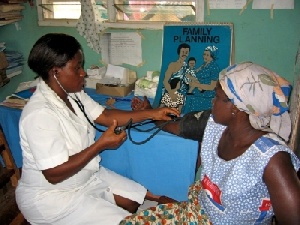Communication is an essential part of human life and its importance in our modern day service delivery can never be underestimated.
It is not only about the words we say, also the tone of your voice when you speak, the attention we give to people(clients) when they speak to us, the way we move and position our bodies and the accuracy and clarity of what we write are all key elements of good communication. To make it very simple, communication is the very thing that give meaning to all our social interaction.
The increasing complex needs of patients, an explosion of medical knowledge and widespread shift in healthcare system have set a stage for a need for more effective and strategic communication in the health sector.
In fact, research has shown that no matter how knowledgeable a health worker might be, if he or she is not able to have a good communication with the patient, he or she may not be able help.
It is obvious that a patient’s capacity to follow medical recommendations and adopt preventive health behaviours is very much dependent on how effectively he or she was communicated to.
In Ghana, effective communication in healthcare has always been a challenge and often leaves patients disappointed and unsatisfied with services delivered to them at the various health facilities across the country.
Miscommunication in the health sector is not just a challenge to service delivery outcomes but, a gross violation of the patient right as well.
Most diagnostic decisions come from communication with the patient, but sadly often, patients are not provided with enough opportunity or time to tell their story due to frequent unwanted interruptions which further compromises on diagnostic accuracy.
Have you ever received a medical treatment at a Hospital without knowing your diagnosis? If YES then be my guest!! In Ghana today, so many patients go to the hospital for treatment and they are not even told what kind of diseases they are suffering from or what might have even contributed to their condition.
It has become a common norm for service providers to easily get angry or for a patient to even get abused when the patient tries to make enquiries about his/her own condition or when caretakers tries to inquire about the progress of the patients they have sent to the hospitals for treatment.
This kind of acts by service providers does not only discourage, frustrate and demoralise patients from seeking medical treatment but also a violation of their right.
According to the patient charter of the Ghana health service, the patient is entitled to full information on his or her condition, management and the possible risk involved, except in emergency situation when patient is unable to make a decision and need for treatment is urgent; but service providers in Ghana have turned a blind eye to this directive and see nothing wrong with denying the patient information concerning his own health.
Sometimes, you walk into a consulting room and before you finish telling your story, the care giver had already written your prescriptions without even saying a word to you and even more sadly, the prescription handed to you is often written in a language only the Prescriber and the Pharmacist can read which means you have no knowledge on your condition and the medication until it is dispensed to you with the popular instructions ''Bako anopa Bako Ayunbr3' with no further communication on contraindication, side effects and other factors which may compromise treatment success.
This usually happens during the closing hours of work when providers are in a rush to leave the work place. So the question is, How can you effectively diagnose and treat your patient without any probe into their condition? And how do you expect the patient to feel that he or she was properly treated with such minimal interaction even though the diagnosis and the treatment might be right?
It is very important to note that, the quality of communication in both history taking segment and management plan has a big influence on the patient health outcomes and their ability to open up to the provider and give all the information needed for their care is depended on how well a communication is "opened" up with them.
It is no hidden fact that patients who have an idea about their condition are more cooperative in their treatment than those who do not have enough information about their condition.
The patient is not expected to understand all the technicalities in his or her diagnosis but a simple explanation to what is wrong with them and how come they are in such condition gives them better understanding on how to prevent such condition from occurring again.
Have you ever been asked to go for laboratory investigations without knowing the kind of test you are going for? Why such investigations are needed and what sample will be taken for the investigations? And even after such investigations are made, how well and in what manner are the patients made to understand the results whether positive or negative.
Have you ever been woken up from your sleep, given a medicine to take without knowing the name, purpose and the contraindication of that medication? And this is a very common practice at the hospital wards.
I remember very well during my training as a community health nurse that, before you perform any procedure on any conscious patient, you need to establish good rapport with the patient, explain all necessary procedures, any possible side effects and seek for the patients consent in every step of your procedure on the patient.
But what do we see today? All these measures are put in place to ensure the patients comfortability and boost their confidence and trust so that they can open up more on their conditions for the care giver to give them the best help they can offer.
But it simply looks like this important aspect of patient care in our various health facilities across the country is missing and it seems no one sees anything wrong with that.
One thing service providers seems not to understand is that, service provision to the patient is an obligation which requires no compromises; So every aspect of the service delivery should be delivered to the patient without seeing it as a sort of privilege for the patient for it is their exclusive right.
The communication challenges in our health sector is a major problem and is not only about provider to patients, also among service providers. A lot of such miscommunication about the patient happen between providers especially during handovers, documentation about a patient and failure to read patients records before commencing treatment.
All the endpoint of such miscommunication points to the patient’s health as the sufferer. It is important to know that good communication among healthcare providers influences the quality of working relationship, job satisfaction and ultimately improves patient’s safety.
The modern care of service delivery has shifted from responding to acute illness to maintaining health and this trend requires that we empower the individuals to take more responsibility of their health by given them enough and accurate information about the choices they need to make to stay healthy through effective communication.
The clients are the very reason why we work, so before they leave your care, take a moment and ask yourself, How well have i served them?
Opinions of Monday, 29 January 2018
Columnist: Isaac Ackah















